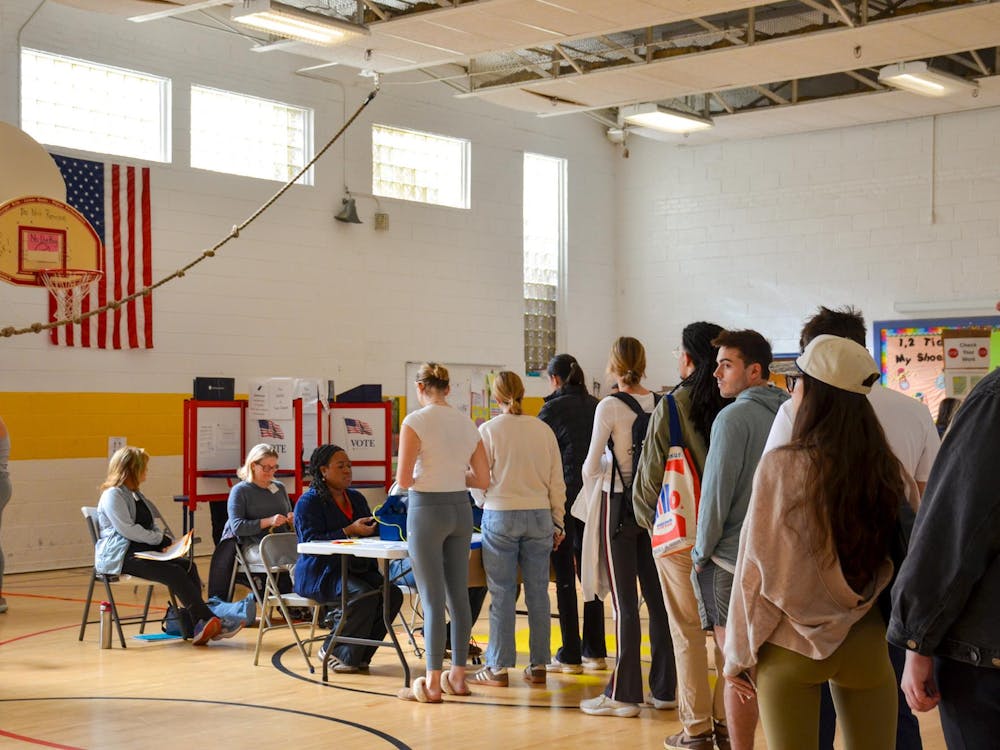In the midst of two campaigns with historic racial and gender implications, the Miller Center for Public Affairs held a “Race and Gender and American Politics” roundtable discussion last night, leading University professors to note that the two issues have taken on new and unprecedented roles in advance of the Nov. 4 presidential election.
The forum, hosted by The Wall Street Journal’s Douglas Blackmon, featured Politics Profs. Paul Freedman, Lynn Sanders, Vesla Weaver and Nick Winter as well as Psychology Prof. Brian Nosek.
Blackmon said race and gender are especially interesting subjects to focus on right now because of their roles in the current presidential election.
“The thing that I really want to focus on is the incredible media attention [that has been given to that question], of will Obama lose the election because of race?” Sanders inquired during her introductory speech. “I think its interesting how tied we are to that pessimism.”
While Sanders said she believes there is still a presence of racist pessimism, she also noted, there has been a recent move toward open discussion about race in politics in the United States.
“I think we’re approaching a situation where we’re more comfortable in our discussion about race,” Sanders said.
Weaver noted that much of her research has been focused around the question of whether race matters in voters’ choice of candidates. Though she said she found “race does matter” in some aspects of voter choice, she said such an impact was not always pejorative in nature.
“The fascinating thing is it’s not all negative,” Weaver said. “When [people were] asked [to choose] which candidate was more hardworking, the percentages [were higher for] light-black skinned candidates [and] dark-black skinned candidates [than for] white candidates.”
Blackmon, however, challenged Weaver and Sanders, noting that they may be perceived as being racially conservative or at risk of overlooking the negative impact race can have on a political campaign.
“That’s the first time I’ve been charged as being a racial conservative in a room,” Weaver said. “I’m certainly not saying there aren’t racial issues ... but I do think we need to question how much the negative aspect of race is what makes headlines.”
Winter, meanwhile, noted that racial issues may have a broader positive impact on the political system.
“In some ways, having race with an American candidate ... it may be an opportunity for that kind of explicit thought, for [people to express] the kind of values we hold,” Winter said, noting that at times when race or gender is left out of the picture, people do not always pay a lot of attention to politics.
Winter also focused his introduction on discussing the idea of gender and its effect on how people view politicians, similarly to how Sanders and Weaver focused on race.
“Our ideas about what makes a good leader are those associated [with] men and masculinity,” Winter said.
He added that he has found that more feminine terms tend to be associated with the Democratic Party, whereas more stereotypical masculine characteristics have been associated with the Republican Party.
Both Freedman and Nosek spoke about the role of implicit and explicit messages in the media and in advertising and their effect on people’s political views.
“People develop a lot of [implicit] associations that explicitly they would not,” Nosek said. For example, “it’s harder to associate ‘female’ with ‘leader.’”
Freedman noted that he believes Alaska Gov. Sarah Palin (R) has been able to capitalize on both feminine and masculine characteristics to gain public attention in her vice presidential campaign.
“Well, I think that she has captured the public imagination, in part because of these masculine characteristics,” Freedman said, noting that one of these perceived masculine characteristics includes Palin’s membership in the National Rifle Association. She “also presents herself as a hockey mom, which is an image which puts her at the base of the family. [So, she is also] holding on to more traditionally feminine characteristics.”
Overall, the professors generally seemed to agree with the notion that race and gender are affecting the American political landscape in different and — in some cases — new ways, some of which run contrary to what has occurred in the past.
“American politics has been pretty white and pretty male for a long time, and now we’re changing it,” Sanders said.






